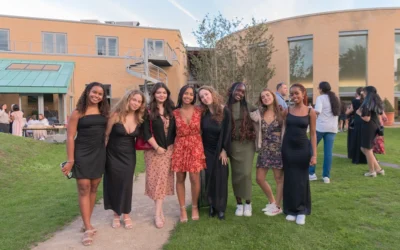Which Careers Can You Pursue With a Modern Foreign Languages Degree?

Studying a modern foreign language opens the door to a multitude of career opportunities – not just teaching! The ability to communicate with a variety of people, and to understand and value many cultures and walks of life, is invaluable.
Studying a Modern Foreign Languages degree also allows you to develop key transferable skills such as communication, creativity, critical thinking and interpersonal skills, all integral to a wide variety of sectors.
To give you an idea of the types of roles you can pursue after your degree, and to help you decide which job best suits you, here’s a list of nine career sectors to consider after graduation!
1. Translation
Translation is probably the sector that immediately springs to mind when you consider careers in modern languages. It is, after all, the most directly applicable.

What is a translator?
Translators must be fluent in two or more languages (including their first language). Usually, translators render language from their second language into their ‘mother tongue’. For example, if you’re a native English speaker and studied French at university, as a translator you’d usually be given a piece in French to translate into English.
The skill of translation is complex and nuanced – more so than you may think! It isn’t just about rendering a work into English, but about conveying the same meaning, paying attention to specificities and idiomatic phrasing in different languages. Nothing is ‘directly translatable’, so it can be considered more of an art form, requiring good judgement and editorial decisions to culturally and linguistically adapt the work to suit the intended audience.
Career options for translators
There exists a variety of content types that translators can specialise in, including:
- Commercial
- Educational
- Financial
- Legal
- Marketing and advertising
- Medical
- Political
- Scientific
- Technical
Translators can either work as a freelancer or in an in-house role, so salary and working hours vary greatly. Yet, this does mean that you can benefit from a good deal of flexibility!
2. Interpreting
Whilst translation is all about the written word, interpreting is a career all about verbal communication.

What is an interpreter?
Being an interpreter demands you understand and memorise content in the original source language, and then reproduce it in the target language. Interpreting is usually done into your mother tongue, and can be carried out in-person, by telephone, via video conferencing or through use of online technologies.
Career options for interpreters
A variety of interpretation exists (including simultaneous, consecutive, liaison and sign language), so interpreting is as flexible as translation is.
There are three types of interpreter:
- Conference Interpreters primarily use simultaneous (immediate) interpreting. Conference interpreters can work in-house for a large international organisation, or within large international conferences and events.
- Business Interpreters work in smaller functions like company meetings and formal dinners.
- Public Service Interpreters work within the criminal justice system, court hearings, immigration tribunals, and social services and housing.
Interpreting, like translation, can be freelance or in-house, hence salary and working hours are flexible and dependant on the individual’s circumstances.
3. Journalism and Media
Modern languages also lend themselves well to the sector of journalism and media.

What does a job in journalism and media entail?
Jobs in this field can range from a broadcast journalist to publishing copy editor to newspaper columnist.
The written and spoken communication, creative and critical thinking, and leadership skills developed over the course of a Modern Language degree are all highly valuable and lend themselves very well to this sector.
Gaining work experience in journalism, media and publishing is very important. Writing and editing for student newspapers and magazines, seeking out internships and shadowing reporters and journalists, as well as developing your writing skills independently on an online blog or magazine, are all great ways to get an ‘in’ into the industry.
Career options in journalism and media
The journalism and media sector opens up opportunities in regional and local newspapers, radio and television stations such as the BBC, magazines, media and broadcast companies, and creative digital media companies.
Workers in this industry usually earn around £33,000 per year, but this depends on your job title, unique experience and employer.
4. Education
Becoming an English as a Foreign Language (EFL) teacher is also a popular career option for Modern Language graduates.

What is an EFL teacher?
EFL teachers help students to learn and develop their English language skills. You’ll use a variety of course books and online materials to nurture students’ written and spoken language skills. You’ll also be instrumental in developing students’ vocabulary and understanding of grammar.
EFL teachers usually teach in English, meaning students develop the language very quickly.
Career options for EFL teachers
For EFL teachers, there are options to work in commercial language schools or institutions of higher education in the UK and abroad. As well as planning and delivering lessons, EFL teachers prepare and set tests, create education materials, attend training sessions, and take part in cultural and social activities.
Salaries vary considerably. You can earn up to and over £35,000 per year if you have a few years’ worth of experience and decide to work in further and higher education.
5. Academic Research
Another option for an MFL graduate is to enter into the academic research field.

What is an academic researcher?
Academic researchers publish papers based on in-depth and pioneering research into their particular area of expertise. As an academic researcher, your reports, books or chapters will be published in peer-reviewed journals.
Alongside research, you’ll most likely tutor university students and speak at events such as conferences, as well as attend meetings to help direct your subject department. You’ll also analyse large sets of data and undertake literature reviews as part of your work.
Career options for academic researchers
As an academic researcher, you could be employed as a PhD student, research fellow or associate, or higher education lecturer or professor. Most academic researchers are based in universities and will supervise PhD candidates, Master’s students and undergraduates.
Salary varies greatly, from £17,000 a year as a PhD student to over £100,000 for professors and deans.
6. Diplomacy
Of course, the ability to speak other languages fluently is highly valuable in the diplomacy sector, as you work overseas with people from various countries and walks of life.

What is a diplomatic service officer?
Diplomatic service officers play a key role in promoting British interests overseas through working for the Foreign, Commonwealth and Development Office. You’ll work with foreign policy and service delivery overseas, and potentially in conflict resolution, counter terrorism, climate change or human rights.
Other responsibilities include liaising with embassies, directing the running of diplomatic visits, analysing written material, and handling queries.
Career options for diplomatic service officers
Work is usually based in a remote or large embassy (such as those in Washington DC) or within the FCDO’s London offices.
The main way to get into diplomacy is through the Civil Service Diplomatic and Development Fast Stream. On this scheme you earn £28,000 per year, which can rise to £48,000 in the space of five years if completed successfully. Other job benefits include a pension scheme, further language learning opportunities, child care assistance and flexible working.
7. Intelligence
Intelligence and security agencies value languages as a key component of their work liaising with diplomats, politicians and leaders overseas. For example, language specialists at MI5 contextualise and translate a wide variety of audio and written material to help drive investigations forward and shape government policy.

What is an intelligence analyst?
Intelligence analysts assess intelligence data to protect UK security and foster economic prosperity. This includes cybercrime, drug trafficking and counter terrorism. Intelligence analysts usually work for the armed forces, police or the UK’s three intelligence and security agencies: GCHQ, MI5 and MI6.
An intelligence analyst’s key responsibilities include the collation and validation of intelligence through evaluating reliability and credibility. You’ll also liaise and collaborate with colleagues to gather and deliver information through formal reports and presentations.
Career options for intelligence analysts
Salaries start at around £30,000 per year, but can reach up to £45,000 after several years’ experience. Intelligence analysts work a typical 37-hour week, but may work extra hours if required.
8. International Aid and Development
Unsurprisingly, the ability to communicate effectively is vital in the international aid and development sector.

What is an international aid and development worker?
International aid and development workers offer aid and assistance to those in developing countries. This includes responding directly to emergencies, crises and natural and man-made disasters, and working to problem solve by implementing sustainable solutions in education, health and sanitation.
International aid and development entails the administration of day-to-day office work, organising fundraising, researching and writing project proposals and reports, recruiting staff (including volunteers), liaising with internal and external stakeholders, and implementing security procedures.
Career options for international aid and development workers
Areas for international aid work include conflict, education, environment, healthcare, human rights and security.
Working hours can be long and unpredictable, particularly when you’re responding to a crisis situation. Starting salaries in NGOs are usually in the region of £18,000 to £25,000 per year, where experienced positions can earn you up to and around £37,000.
9. Marketing and Advertising
Again, the strong communication, interpersonal and creative and organisational skills you develop over the course of a Modern Languages degree lend themselves well to the marketing sector.

What is a marketing executive?
Jobs in this field, such as a marketing executive, promote products and services by planning, creating and promoting marketing campaigns. Working in this sector involves advertising, public relations, developing products and research.
You must also understand and communicate effectively with your target audience, write and proofread marketing copy, make and publicise creative content, distribute materials, and maintain strong relationships with clients and stakeholders.
Career options for marketing executives
You could work in the private or public sector, promoting and developing the brand, product or service you’re promoting.
Starting salaries are around £20,000 per year, but you could earn over £100,000 with several years of experience as a marketing director. Office hours are typically 9am to 5pm weekdays (although sometimes you could be required to work weekends or overtime).
Finding the career best suited to you doesn’t have to be a chore! Keep exploring the wide variety of sectors you could get involved in through in-depth research. Signing up for work experience internships is also a great way to develop key skills and experience in your future job sector.

By Keziah Mccann
Keziah is a second-year French and Italian student at Balliol College, University of Oxford. As well as learning languages and travelling, her interests include writing, journalism, film and cooking.
Get a head start on your future!
Recommended articles
Demystifying the UK University Application Process for Educators
The UCAS applications process for UK universities can appear daunting for students and teachers alike. With that said, educators play an important role in students’ success with their university applications. As such, it is paramount that educators understand the UK...
How to Secure Strong References for Your UCAS Applications
References are a crucial component of your UCAS application, offering a holistic view of your potential as an applicant. Your application will ask for references who can testify to your potential as a student and what you have to offer the university or college...
A Day in the Life of a History Student
It’s been over three years since I first sent my UCAS application off to Oxford University, meeting the early submission deadline by a slither and breathing a sigh of relief. Now, as a third-year History finalist on the cusp of exams, I can safely say that these...


